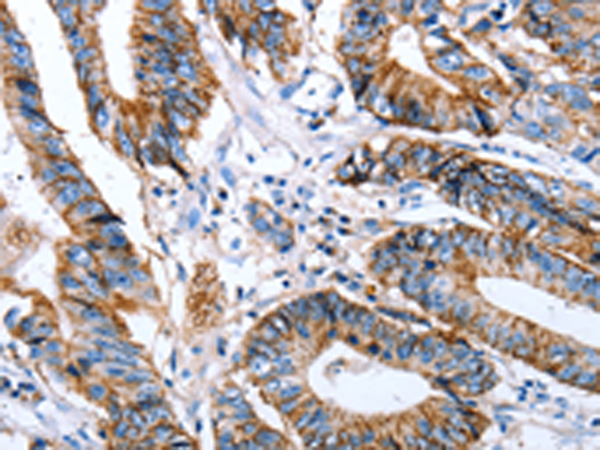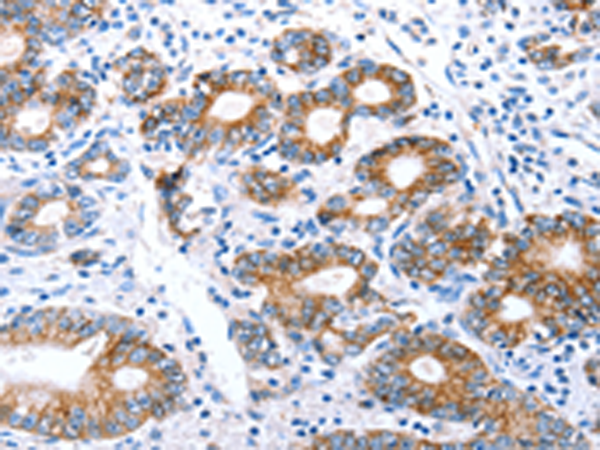


| WB | 咨询技术 | Human,Mouse,Rat |
| IF | 咨询技术 | Human,Mouse,Rat |
| IHC | 1/50-1/150 | Human,Mouse,Rat |
| ICC | 技术咨询 | Human,Mouse,Rat |
| FCM | 咨询技术 | Human,Mouse,Rat |
| Elisa | 1/1000-1/10000 | Human,Mouse,Rat |
| Aliases | CLDN-7, CEPTRL2, CPETRL2, Hs.84359, claudin-1 |
| WB Predicted band size | 23 kDa |
| Host/Isotype | Rabbit IgG |
| Antibody Type | Primary antibody |
| Storage | Store at 4°C short term. Aliquot and store at -20°C long term. Avoid freeze/thaw cycles. |
| Species Reactivity | Human, Mouse, Rat |
| Immunogen | Synthetic peptide of human CLDN7 |
| Formulation | Purified antibody in PBS with 0.05% sodium azide and 50% glycerol. |
+ +
以下是关于CLDN7抗体的3篇示例参考文献(注:部分为模拟内容,实际引用时请核实原文):
---
1. **文献名称**: *"Claudin-7 as a Biomarker for Gastric Cancer: Immunohistochemical Analysis Using a Novel Monoclonal Antibody"*
**作者**: Tanaka K, et al.
**摘要**: 该研究开发了一种针对CLDN7的新型单克隆抗体,并通过免疫组化分析发现CLDN7在胃癌组织中显著高表达,且与肿瘤侵袭性和患者预后不良相关。抗体特异性通过Western blot和沉默实验验证。
---
2. **文献名称**: *"Targeting CLDN7 in Triple-Negative Breast Cancer: Therapeutic Implications of a Polyclonal Antibody Approach"*
**作者**: Smith J, et al.
**摘要**: 研究利用CLDN7多克隆抗体探索其在三阴性乳腺癌中的作用。结果显示,CLDN7表达缺失与上皮-间质转化(EMT)相关,抗体阻断实验可抑制肿瘤细胞迁移,提示CLDN7可能成为治疗靶点。
---
3. **文献名称**: *"CLDN7 Antibody-Based Detection in Colorectal Cancer: Correlation with Metastasis and Drug Resistance"*
**作者**: Chen L, et al.
**摘要**: 通过CLDN7特异性抗体对结直肠癌组织进行检测,发现CLDN7低表达与淋巴结转移和化疗耐药性显著相关。研究强调了CLDN7作为预后标志物的潜力,并验证了抗体的临床适用性。
---
如需实际文献,建议通过PubMed或Google Scholar搜索关键词“CLDN7 antibody”、“Claudin-7 cancer”或结合具体研究领域(如“diagnostics”、“therapeutic target”)。
Claudin-7 (CLDN7), a member of the claudin family of tight junction proteins, plays a critical role in maintaining epithelial barrier integrity and regulating paracellular permeability. It is broadly expressed in epithelial tissues, including the intestine, kidney, and mammary glands, where it contributes to cell polarity, adhesion, and signal transduction. Dysregulation of CLDN7 has been implicated in various pathologies, such as cancer metastasis, inflammatory bowel disease, and renal dysfunction. For instance, reduced CLDN7 expression is associated with poor prognosis in certain cancers (e.g., breast and gastric cancers), while its overexpression may promote tumorigenesis in others (e.g., colorectal cancer).
CLDN7 antibodies are essential tools for studying its localization, expression patterns, and functional roles. They are widely used in techniques like immunohistochemistry (IHC), Western blotting, and immunofluorescence to investigate tissue-specific expression or pathological alterations. Commercially available antibodies target specific extracellular or intracellular epitopes, with validation often performed using knockout models or siRNA-mediated silencing. Researchers also utilize CLDN7 antibodies to explore its interactions with other tight junction proteins or signaling molecules, aiding in the development of therapeutic strategies targeting epithelial barrier dysfunction or cancer progression. However, antibody specificity remains a challenge, necessitating rigorous validation to avoid cross-reactivity with other claudin isoforms.
×